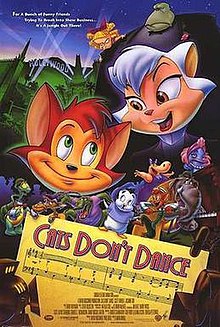
Bosko is an animated cartoon character created by animators Hugh Harman and Rudolf Ising. Bosko was the first recurring character in Leon Schlesinger's cartoon series and was the star of thirty-nine Looney Tunes shorts released by Warner Bros. He was voiced by Carman Maxwell, Bernard B. Brown, Johnny Murray, and Philip Hurlic during the 1920s and 1930s and once by Don Messick during the 1990s.
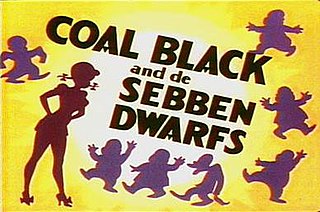
Coal Black and de Sebben Dwarfs is a 1943 Merrie Melodies animated cartoon directed by Bob Clampett. The short was released on January 16, 1943.

The Emperor's New Groove is a 2000 American animated fantasy comedy film produced by Walt Disney Feature Animation and released by Walt Disney Pictures. It was directed by Mark Dindal and produced by Randy Fullmer, from a screenplay written by David Reynolds, and based on a story conceived by Dindal and Chris Williams. The voice cast features David Spade, John Goodman, Eartha Kitt, Patrick Warburton, and Wendie Malick. Inspired by ancient Peruvian culture and set in an Incan empire, The Emperor's New Groove follows selfish young Emperor Kuzco, who is accidentally transformed into a llama by his treacherous ex-advisor, Yzma (Kitt), and her dimwitted henchman Kronk (Warburton). For the emperor to change back into a human, he entrusts a village leader, Pacha (Goodman), to escort him back to the palace before Yzma can track them down and finish him off.
Turner Entertainment Company is an American multimedia company founded by Ted Turner on August 2, 1986. Purchased by Time Warner Entertainment on October 10, 1996, as part of its acquisition of Turner Broadcasting System (TBS), the company was largely responsible for overseeing the TBS library for worldwide distribution. In recent years, this role has largely been limited to being the copyright holder, as it has become an in-name-only subsidiary of Warner Bros., which currently administers their library.

The Cat Concerto is a 1947 American one-reel animated cartoon and the 29th Tom and Jerry short, released to theatres on April 26, 1947. It was produced by Fred Quimby and directed by William Hanna and Joseph Barbera, with musical supervision by Scott Bradley, and animation by Kenneth Muse, Ed Barge and Irven Spence and uncredited animation by Don Patterson.

Warner Bros. Animation Inc. is an American animation studio which is part of the Warner Bros. Television Group, a division of Warner Bros., which is a subsidiary of Warner Bros. Discovery and serves as the animation division and label of Warner Bros.
Mark Dindal is an American filmmaker, animator and voice actor. Best known for his work at Disney, he directed the company's 2000 animated film The Emperor's New Groove (2000), as well as their 2005 film Chicken Little. Prior, he was credited with animation work on the Disney Renaissance films The Little Mermaid (1989) and Aladdin (1992), as well as Tom and Jerry: The Movie (1992). In 1997, he briefly moved to Warner Bros. Animation and made his directorial debut with the film Cats Don't Dance, which won an Annie Award for Best Animated Film. Dindal directed the 2024 animated film The Garfield Movie for Sony Pictures and Alcon Entertainment, which was met with commercial success despite negative reviews.
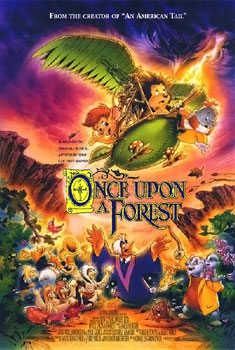
Once Upon a Forest is a 1993 animated adventure film produced by Hanna-Barbera Productions and distributed by 20th Century Fox. Based on the Furlings characters created by Rae Lambert, the film was directed by Charles Grosvenor and produced by David Kirschner, and stars the voices of Michael Crawford, Ellen Blain, Benji Gregory in his final film role, Paige Gosney, Will Estes, Janet Waldo, Elisabeth Moss and Ben Vereen.
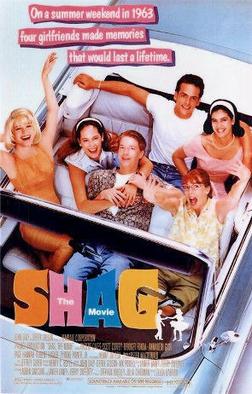
Shag is a 1989 American comedy film starring Bridget Fonda, Phoebe Cates, Annabeth Gish, Page Hannah, Jeff Yagher, and Scott Coffey. Directed by Zelda Barron, the film features Carolina shag dancing and was produced in cooperation with the South Carolina Film Commission. The soundtrack album was on Sire/Warner Bros. Records.

Warner Bros. Family Entertainment was the family division label of Warner Bros. Entertainment. It released numerous theatrical and direct-to-video family-oriented films and television shows.
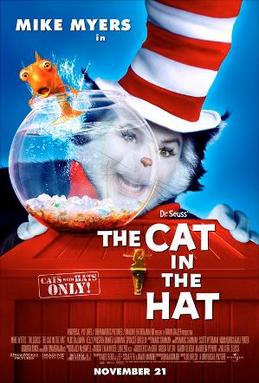
The Cat in the Hat is a 2003 American fantasy comedy film directed by Bo Welch in his directorial debut and written by Alec Berg, David Mandel and Jeff Schaffer. Loosely based on Dr. Seuss's 1957 book of the same name, it was the second and final live-action Dr. Seuss adaptation after How the Grinch Stole Christmas (2000). The film stars Mike Myers in the title role along with Alec Baldwin, Kelly Preston, Dakota Fanning, Spencer Breslin, Amy Hill and Sean Hayes in supporting roles.

Jill Culton is an American animator, storyboard artist, director, and screenwriter. With her directorial debut on Sony's first animated film, Open Season, she became the first female principal director of a big budget, computer-generated feature.
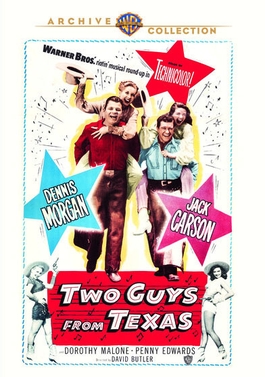
Two Guys from Texas is a 1948 American made Western-themed musical comedy film starring longtime song-and-dance partners Dennis Morgan and Jack Carson. Directed by David Butler, it was written by Allen Boretz and I.A.L. Diamond, and features Dorothy Malone and Penny Edwards in support.
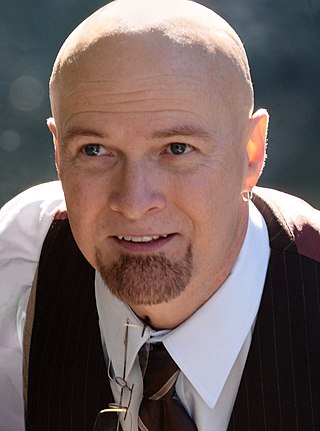
Rick Calabash is an American film and television producer, writer and director, particularly of animated family films.
Daffy Duck and Porky Pig Meet the Groovie Goolies is a 1972 American animated one-hour television movie that was broadcast on ABC on December 16, as an episode of the anthology series The ABC Saturday Superstar Movie. In this Filmation-produced movie, Daffy Duck, Porky Pig, and other Looney Tunes characters interact with the characters from the Filmation series Groovie Goolies.

Warner Bros. Pictures Animation (WBPA), formerly known as Warner Animation Group (WAG), is an American animation studio that serves as the animated feature film label of Warner Bros.' theatrical film production and distribution division, Warner Bros. Pictures. Established on January 7, 2013, by Jeff Robinov, the studio is the successor to the dissolved 2D traditional hand-drawn animation studio Warner Bros. Feature Animation, which shut down in 2004, and is also a sister to the regular Warner Bros. Animation studio.

The Fearless Four is a 1997 German animated musical film loosely based on the folk tale of the "Town Musicians of Bremen" by the Brothers Grimm, about four funny animals that all have one thing in common: they want to sing, but can't for assorted reasons. Combining traditional animation with computer animation, the film was produced by Munich Animation and released by the German unit of Warner Bros. under the Warner Bros. Family Entertainment label. Producer Eberhard Junkersdorf won a Bavarian Film Award in 1998 for "Best Production".

Tom & Jerry is a 2021 American live-action animated comedy film based on the cartoon characters Tom and Jerry created by William Hanna and Joseph Barbera, produced by Warner Animation Group and distributed by Warner Bros. Pictures. It is the second theatrical film based on the characters, following Tom and Jerry: The Movie (1992). Directed by Tim Story and written by Kevin Costello, the film stars Chloë Grace Moretz, Michael Peña, Colin Jost, Rob Delaney and Ken Jeong.

The Garfield Movie is a 2024 American animated comedy film based on the comic strip Garfield created by Jim Davis. Directed by Mark Dindal from a screenplay by Paul A. Kaplan, Mark Torgove, and David Reynolds, the film stars Chris Pratt as the voice of the titular character, alongside the voices of Samuel L. Jackson, Hannah Waddingham, Ving Rhames, Nicholas Hoult, Cecily Strong, Harvey Guillén, Brett Goldstein, Bowen Yang, and Snoop Dogg. In the film, Garfield is reunited with his long-lost father, a street cat named Vic, before being forced into joining him on a high-stakes adventure. It is the sixth Garfield film adaptation and the first since Garfield's Pet Force, which was released fifteen years prior.
